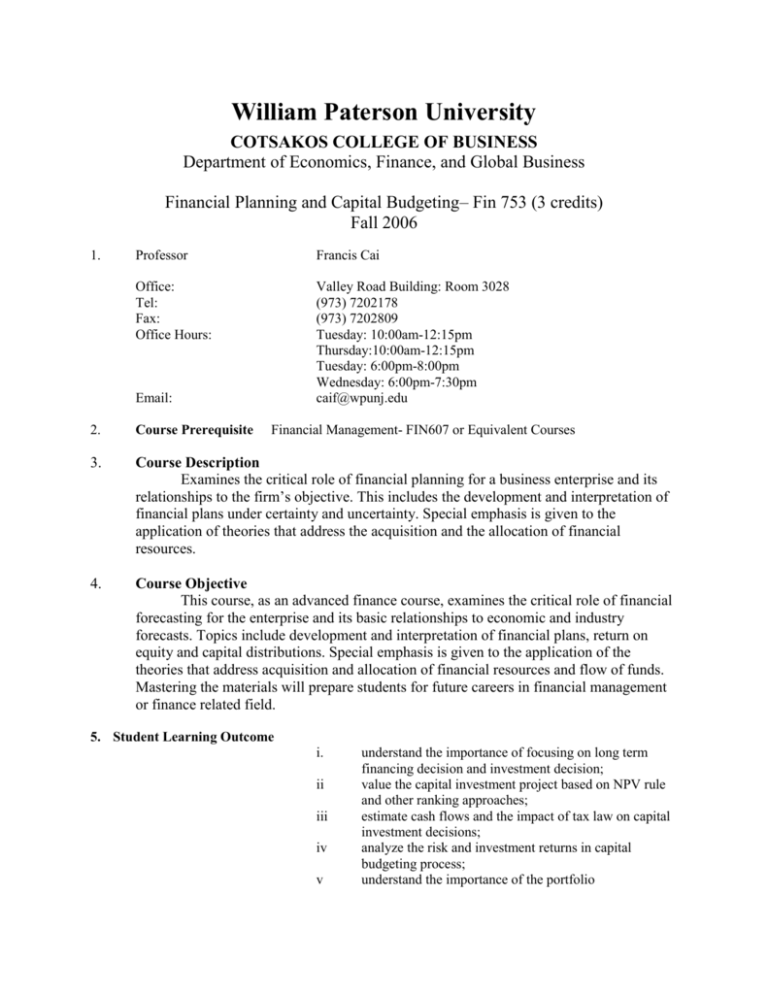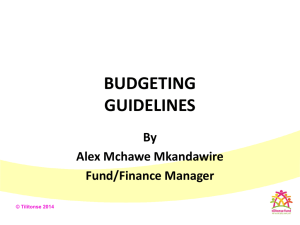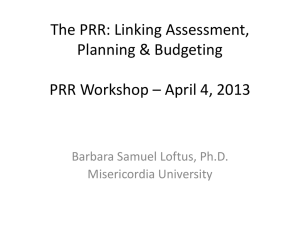William Paterson University
advertisement

William Paterson University COTSAKOS COLLEGE OF BUSINESS Department of Economics, Finance, and Global Business Financial Planning and Capital Budgeting– Fin 753 (3 credits) Fall 2006 1. Professor Francis Cai Office: Tel: Fax: Office Hours: Valley Road Building: Room 3028 (973) 7202178 (973) 7202809 Tuesday: 10:00am-12:15pm Thursday:10:00am-12:15pm Tuesday: 6:00pm-8:00pm Wednesday: 6:00pm-7:30pm caif@wpunj.edu Email: 2. Course Prerequisite Financial Management- FIN607 or Equivalent Courses 3. Course Description Examines the critical role of financial planning for a business enterprise and its relationships to the firm’s objective. This includes the development and interpretation of financial plans under certainty and uncertainty. Special emphasis is given to the application of theories that address the acquisition and the allocation of financial resources. 4. Course Objective This course, as an advanced finance course, examines the critical role of financial forecasting for the enterprise and its basic relationships to economic and industry forecasts. Topics include development and interpretation of financial plans, return on equity and capital distributions. Special emphasis is given to the application of the theories that address acquisition and allocation of financial resources and flow of funds. Mastering the materials will prepare students for future careers in financial management or finance related field. 5. Student Learning Outcome i. ii iii iv v understand the importance of focusing on long term financing decision and investment decision; value the capital investment project based on NPV rule and other ranking approaches; estimate cash flows and the impact of tax law on capital investment decisions; analyze the risk and investment returns in capital budgeting process; understand the importance of the portfolio vi vii viii 6 diversification and its risk reduction effects in capital budgeting; explain the use of Arbitrage Pricing Theory, Option Pricing Theory in capital budgeting; understand the concepts of dividend policy, capital structure, and their impacts on capital investments; demonstrate the understanding of interactions between investment and financing decisions in capital budgeting; Teaching Method Lecture, class discussion, case study, and hands-on experience* in E-trade Financial Learning Center. 7. Textbook 8. Grading Policy Seitz and Ellison, Capital Budgeting and Long-Term Financing Decision, 4th Edition (The Dryden Press) The final grade will be calculated as follows: Class Participation and Homework Problem sets Midterm Final 10% 10% 35% 45% Final Grade will be curved to an approximate distribution as follows: A+ A AB+ B BC+ C CD+ D DF 97 94 90 87 84 80 77 74 70 67 64 60 below 60 9. Outline Week 1,2,3 Chapter 1,2,3,4 Topic Foundations for Capital Budgeting General Introduction to the Course, Requirements; Long-Term Financial Decisions Market Imperfections and Value: Strategy Matters Measuring Wealth: Time Value of Money Value-Driven Management 4,5,6 5 6 7 Criteria for Capital Budgeting Measuring Investment Value: You Can Trust NPV Alternate Measures of Capital Investments Desirability Ranking Mutually Exclusive Investments 7,8,9, 8 9 10 Cash Flows Analysis in Capital Budgeting Measuring Incremental Cash Flows Taxes and Foreign Investments Inflation and Capital Investments 10,11,12 13 11 12 13 14 15 Uncertainty in Capital Budgeting Introduction to Risk Analysis Single Investment Risk Analysis Risk from the Company's Perspective: Capital Budgeting with Consideration of Firm Risk from the Shareholders? Perspective: Using CAPM in Capital Budgeting Arbitrage Pricing Theory, Option Pricing Theory, and Capital Budgeting Assignment 14,15,16 16,17,18, 19 Capital Structure and Dividend Policy in Capital Budgeting Cost of Capital Capital Structure and Value Capital Structure Decisions Dividend Policy and Investment Decisions 20,21,24 Special Topics in Capital Budgeting Interactions Between Investment and Financing Decisions Lease Analysis Capital Rationing Capital Budgeting in Nonprofit Organizations Multicriteria Capital Budgeting and Linear programming Mergers International Investment and Financing Decisions








